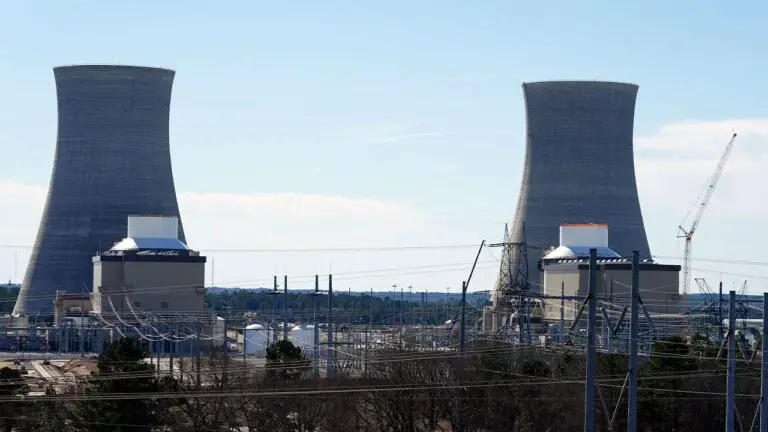Georgia Power Customers Could See Monthly Bill Increase for New Nuclear Plant
Residential customers of Georgia’s largest electrical utility might experience a monthly bill hike of $9 due to the construction of a new nuclear power plant, as per an agreement announced on Wednesday.
Georgia Power Co. has put forth an arrangement that would have customers paying an additional $7.56 billion for the costs associated with the construction of Plant Vogtle.
For the deal to go through, approval is needed from the Georgia Public Service Commission, consisting of five elected commissioners. Typically, such agreements gain persuasive support. With the endorsement of the commission’s Public Interest Advocacy staff and three ratepayer groups, this agreement is expected to avoid contentious hearings concerning the company’s responsibility for massive cost overruns at the new nuclear reactors near Augusta.
New Reactor at Georgia Nuclear Plant Starts Nuclear Reaction for the First Time
The initiation of nuclear reactions for the first time has commenced in a new reactor at the Georgia nuclear plant. Plant Vogtle’s Unit 3 and Unit 4 are significant, being the first reactors constructed from scratch in the US in several decades. Each of these reactors has the capacity to power 500,000 homes and businesses while maintaining a carbon-free operation. Despite growing interest in nuclear power to combat climate change, the expense of the Vogtle project could discourage further investment in nuclear energy.
According to Jacob Hawkins, spokesperson for Georgia Power, the agreement strikes a balance between acknowledging the long-term investment’s value for the state and addressing the affordability concerns of customers.
Liz Coyle, Executive Director of Georgia Watch, a consumer advocacy group endorsing the agreement, pointed out that the reactors might not be cheaper than alternative power sources. However, given the regulators’ past support for Georgia Power’s construction of these reactors, it’s vital to limit the financial impact on consumers.
Public service commissioners refrained from commenting on the deal, stating that all evidence had not yet been presented.
Challenges and Costs of the Vogtle Project
The overall expense, inclusive of financing, stands at $31 billion for Georgia Power and three other co-owners. Additionally, the $3.7 billion that Westinghouse, the initial contractor, paid the Vogtle owners to halt construction pushes the total to nearly $35 billion. The reactors are not only seven years behind schedule but also $17 billion over budget.
Georgia Power states that it has spent $10.2 billion on its share of construction for Vogtle Units 3 and 4, which were built alongside two earlier reactors. Initially, public service commissioners authorized Southern Co. to spend $4.4 billion, but that figure was adjusted to $7.3 billion in 2017 due to delays and overruns.
In a regulatory filing, Georgia Power argued that $8.8 billion out of the $10.2 billion was prudently allocated for construction, while $1.4 billion was wasteful and should be disallowed. Despite this, the company agreed to forgo an additional $1.3 billion that could have been claimed from customers. This decision was influenced by indications that Public Service Commission staffers would argue that even spending below the reasonable cap was squandered due to mismanagement.
Impact on Customers and Concessions
As a result of this agreement, customers could anticipate an extra charge of $8.95 per month on top of their existing $153 monthly bill, starting when Unit 4 becomes operational. Unit 4 is expected to reach commercial operation by March 30. Earlier, when Unit 3 went into commercial operation, bills had already gone up by $5 this month. Furthermore, there was a $16 per month increase due to elevated fuel costs two months ago, in addition to a base rate increase earlier in the year and another one scheduled for the next year.
Hawkins confirmed that Southern Co. shareholders would not be absorbing additional losses under this agreement, as the company had already accounted for $3.26 billion in expected Vogtle losses since 2018. Georgia Power might attempt to recover some of these losses from contractors, and the agreement permits shareholders to retain any such gains.
Georgia Power possesses a 45.7% ownership of the reactors. Smaller shares are held by Oglethorpe Power Corp., the Municipal Electric Authority of Georgia, the city of Dalton, and certain utilities in Florida and Alabama.
Ratepayer Concessions and Energy Efficiency Plans
Ratepayer groups achieved notable concessions in this deal. Georgia Power agreed to double the scope of a bill-relief program that benefits low-income seniors. The plan is set to encompass 96,000 beneficiaries over the next three years, including low-income seniors and individuals with federal housing vouchers or federal disability payments. This program can help reduce average monthly bills by $33.50.
Moreover, Georgia Power committed to expanding energy efficiency programs by 50% to promote energy conservation and lower bills, starting in 2026. Additionally, the company expressed support for state applications to obtain a portion of $7 billion in federal funding aimed at extending solar energy access to low-income households.

